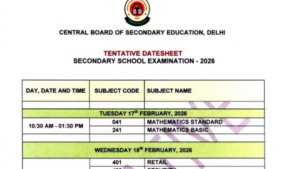NCERT Solutions For Class 10 Civics Democratic Politics -II Chapter 1
Students studying in the Class 10 exam and looking for NCERT Solutions For Class 10 Social Science civics Chapter 1 power-sharing must read the entire article given on this page. In this article, we have given the solutions to all the questions which can be asked from the Powersharing Chapter of Civics. Read all the questions and their solutions given on this page and try to learn them, don’t mug up otherwise you’ll forget what you have studied in Powersharing, always try to learn by linking topics.
NCERT Solutions Class 10 Civics Democratic Politics -II Chapter 1 Powersharing Download PDF
[sso_enhancement_lead_form_manual title=”Download Full PDF of Class 11 Biology Chapter 17 ” button =”Download Now” pdf =”/jobs/wp-content/uploads/2021/12/03020634/Untitled-document-2.pdf”]
Important Question of NCERT Solutions Class 10 Civics Democratic Politics -II Chapter 1 Powersharing
Here We have given the solutions of Chapter 1 Powersharing of Civics Democratic Politics-II. Students will find a major chunk of questions from the vertical division of power-sharing among different levels of government. In this article, we have provided the detailed solution of the Powersharing chapter of Civics. Students studying in 10th Class must read these questions and practice them, it will boost their confidence and also fetch some extra marks in the exam. Bookmark this page and refer to these questions whenever you study Chapter 1 of Civics.
- Consider the following two statements on power-sharing and select the answer using the codes given below:
A). Power-sharing is good for democracy.
B). It helps to reduce the possibility of conflict between social groups.
Which of these statements are true and false?
(a) A is true but B is false
(b) Both A and B are true
(c) Both A and B are false
(d) A is false but B is true
Answer.
(b) Both A and B are true
- Consider the following statements about power-sharing arrangements in Belgium and Sri Lanka.
- In Belgium, the Dutch-speaking majority people tried to impose their domination on the minority French-speaking community.
- In Sri Lanka, the policies of the government sought to ensure the dominance of the Sinhala-speaking majority.
- The Tamils in Sri Lanka demanded a federal arrangement of power-sharing to protect their culture, language, and equality of opportunity in education and jobs.
- The transformation of Belgium from a unitary government to a federal one prevented a possible division of the country on linguistic lines.
Which of the statements given above are correct?
(a) A, B, C, and D
(b) A, B and D
(c) C and D
(d) B, C and D
Answer.
(d) B, C, and D
- Match List I (forms of power-sharing) with List-II (forms of government) and select the correct answer using the codes given below in the lists:
| List I | List II | |
| 1. | Power shared among different organs of government | A. Community government |
| 2. | Power shared among governments at different levels | B. Separation of powers |
| 3. | Power shared by different social groups | C. Coalition government |
| 4. | Power shared by two or more political parties | D. Federal government |
Answer.
| List I | List II | |
| 1. | Power shared among different organs of government | Separation of powers |
| 2. | Power shared among governments at different levels | Federal government |
| 3. | Power shared by different social groups | Community government |
| 4. | Power shared by two or more political parties | Coalition government |
- The Mayor of Merchtem, a town near Brussels in Belgium, has defended a ban on speaking French in the town’s schools. He said that the ban would help all non-Dutch speakers integrate into this Flemish town. Do you think that this measure is in keeping with the spirit of Belgium’s power-sharing arrangements? Give your reasons in about 50 words.
Answer.
The measure of the Mayor of Merchtem to ban on French-speaking in the town’s schools near Brussels is unfair. It does not keep with Belgium’s power-sharing arrangement. Power-sharing helps maintain a balance between different sections of society, and in Belgium, there is a need to maintain the power-sharing between the Dutch and French to avoid civil unrest. Banning French will promote the tendency of civil unrest. To promote peace among different communities, the Mayor should promote a bilingual education system in the town’s schools.
- Read the following passage and pick out any one of the prudential reasons for power sharing offered in this. “We need to give more power to the panchayats to realise the dream of Mahatma Gandhi and the hopes of the makers of our Constitution. Panchayati Raj establishes true democracy. It restores power to the only place where power belongs in a democracy – in the hands of the people. Giving power to Panchayats is also a way to reduce corruption and increase administrative efficiency. When people participate in the planning and implementation of developmental schemes, they would naturally exercise greater control over these schemes. This would eliminate the corrupt middlemen. Thus, Panchayati Raj will strengthen the foundations of our democracy.”
Answer.
The prudential reason in the given passage is – “Giving power to Panchayats is also a way to reduce corruption and increase administrative efficiency.”
- Different arguments are usually put forth in favor of and against power-sharing. Identify those which are in favour of power-sharing and select the answer using the codes given below? Power-sharing:
- reduces conflict among different communities
- decreases the possibility of arbitrariness
- delays the decision-making process
- accommodates diversities
- increases instability and divisiveness
- promotes people’s participation in government
- undermines the unity of a country
| (a) | A | B | D | F |
| (b) | A | C | E | F |
| (c) | A | B | D | G |
| (d) | B | C | D | G |
Answer.
| (a) | A | B | D | F |
- After reading this chapter, three students drew different conclusions. Which of these do you agree with and why? Give your reasons in about 50 words. Thomman – Power sharing is necessary only in societies that have religious, linguistic or ethnic divisions. Mathayi – Power sharing is suitable only for big countries that have regional divisions. Ouseph – Every society needs some form of power sharing even if it is small or does not have social divisions.
Answer.
Ouseph’s conclusion is the right one. Every state should have some or the other form of power-sharing. Power-sharing ensures an optimum balance between different sections in the society. The chances of conflict lessen, and so does the injustice. Hence, power-sharing becomes the value of democracy. Also, power-sharing is a good way to ensure the stability of political order
- What are the different forms of power-sharing in modern democracies? Give an example of each of these.
Answer.
There are different forms of power-sharing in modern democracies. These are given below:
- Horizontal distribution of power – Power is shared among different organs of government, such as the legislature, executive and judiciary. Example – India
- The federal division of power – Power can be shared among governments at different levels – a general government for the entire country and governments at the provincial or regional level. Example – India (Union Government & State Government)
- Community government – Power may also be shared among different social groups such as the religious and linguistic groups. Example – Belgium
- Power-sharing between political parties, pressure groups, and movements – Such competition ensures that power does not remain in one hand. In the long run, power is shared among different political parties that represent different ideologies and social groups.
Q 9. State one prudential reason and one moral reason for power sharing with an example from the Indian context.
Answer.
While prudential reasons stress that power-sharing will bring out better outcomes. In India, the power is shared horizontally among various organs of government. The Legislature, Executive, and Judiciary are responsible for administering India. Reservation is applicable in India, where various sections are given benefits over others to avoid conflicts.
Moral reasons emphasize the very act of power-sharing as valuable. In India, citizens are conferred with fundamental rights, and directive principles of state policies are implied in the government.












 CUET 2026 Free Batches Launched by CUET ...
CUET 2026 Free Batches Launched by CUET ...
 CBSE Date Sheet 2026 for Class 10 & ...
CBSE Date Sheet 2026 for Class 10 & ...
 CBSE Class 10 Date Sheet 2026, Check 10t...
CBSE Class 10 Date Sheet 2026, Check 10t...














